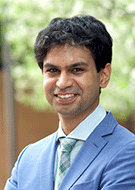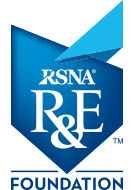Your Donations in Action: Sam Payabvash, MD
Machine learning models help accelerate stroke response


A high volume of cross-sectional scans and the demand for timely interpretation of images with critical findings are among major challenges at all radiology practices.
Deep neural networks with volumetric analysis capabilities have achieved promising results in classification of medical images. These machine learning models can help with surveillance and diagnosis of critical findings like acute infarct, which can be particularly important in resource-challenged parts of the country without access to subspecialty trained radiologists.
In his 2019 Bayer HealthCare/RSNA Research Seed Grant, “Automated Detection of Acute Ischemic Infarct on ‘Code Stroke’ Head CT Using Deep Neural Networks,” Seyedmehdi “Sam” Payabvash, MD, worked with colleagues at Yale School of Medicine to apply deep neural network machine learning models for detection of acute ischemic infarct in patients scanned as part of their “code stroke” imaging protocol.
Watch Dr. Payabvash discuss his research.
Working closely with his intrainstitutional mentor Ajay Malhotra, MD, and extrainstitutional mentors Christopher Filippi MD, and Pina C. Sanelli, MD, Dr. Payabvash and his team modified and applied a convolutional neural network (CNN) pretrained for classification of 2D images for use in classification of a 3D dataset.
By averaging the extracted features in the flattening layer of the VGG-16 deep neural network, they were able to use the CNN structure to accurately classify batches of three consecutive head CT slices based on the presence or absence of acute ischemic infarct.
“The national records have shown that up to recently, as much as 25% of eligible stroke patients are not receiving thrombolytic therapy, which could be in part due to lack of access to quick and reliable imaging interpretation,” Dr. Payabvash said. “Our proposed automated infarct detection tool can potentially improve the diagnostic and time-efficiency of radiologists in busy clinical settings or rural community hospitals.”
He noted that his 2019 Bayer HealthCare/RSNA Research Seed Grant helped pave the road for establishing his research-oriented career. Dr. Payabvash’s current research is focused on design, implementation and evaluation of innovative neuroimaging tools for personalized treatment of patients with cerebrovascular diseases.
“Since receiving the RSNA grant, I have received additional extramural grants as principal investigator from NIH, the Doris Duke Foundation, the Foundation of American Society of Neuroradiology and NVIDIA,” Dr. Paybabvash noted.
For More Information
Learn more about R&E Funding Opportunities.
Read last month’s Your Donations in Action article.
Find Dr. Payabvash on Twitter @SamPayabvash